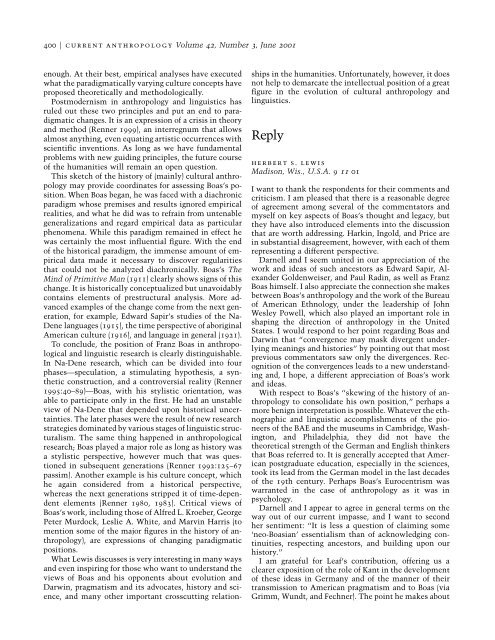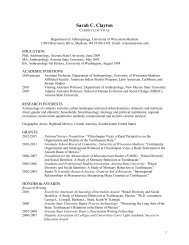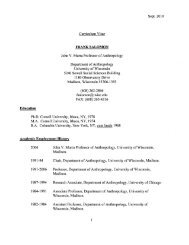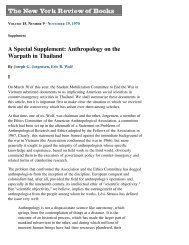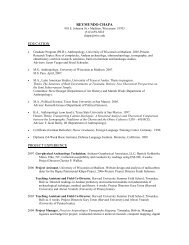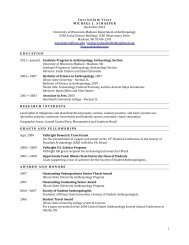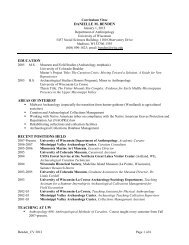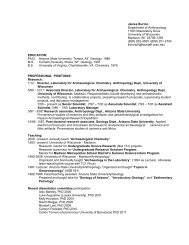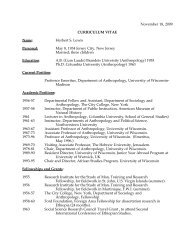Boas, Darwin, Science, and Anthropology1 - Department of ...
Boas, Darwin, Science, and Anthropology1 - Department of ...
Boas, Darwin, Science, and Anthropology1 - Department of ...
Create successful ePaper yourself
Turn your PDF publications into a flip-book with our unique Google optimized e-Paper software.
400 F current anthropology Volume 42, Number 3, June 2001<br />
enough. At their best, empirical analyses have executed<br />
what the paradigmatically varying culture concepts have<br />
proposed theoretically <strong>and</strong> methodologically.<br />
Postmodernism in anthropology <strong>and</strong> linguistics has<br />
ruled out these two principles <strong>and</strong> put an end to paradigmatic<br />
changes. It is an expression <strong>of</strong> a crisis in theory<br />
<strong>and</strong> method (Renner 1999), an interregnum that allows<br />
almost anything, even equating artistic occurrences with<br />
scientific inventions. As long as we have fundamental<br />
problems with new guiding principles, the future course<br />
<strong>of</strong> the humanities will remain an open question.<br />
This sketch <strong>of</strong> the history <strong>of</strong> (mainly) cultural anthropology<br />
may provide coordinates for assessing <strong>Boas</strong>’s position.<br />
When <strong>Boas</strong> began, he was faced with a diachronic<br />
paradigm whose premises <strong>and</strong> results ignored empirical<br />
realities, <strong>and</strong> what he did was to refrain from untenable<br />
generalizations <strong>and</strong> regard empirical data as particular<br />
phenomena. While this paradigm remained in effect he<br />
was certainly the most influential figure. With the end<br />
<strong>of</strong> the historical paradigm, the immense amount <strong>of</strong> empirical<br />
data made it necessary to discover regularities<br />
that could not be analyzed diachronically. <strong>Boas</strong>’s The<br />
Mind <strong>of</strong> Primitive Man (1911) clearly shows signs <strong>of</strong> this<br />
change. It is historically conceptualized but unavoidably<br />
contains elements <strong>of</strong> prestructural analysis. More advanced<br />
examples <strong>of</strong> the change come from the next generation,<br />
for example, Edward Sapir’s studies <strong>of</strong> the Na-<br />
Dene languages (1915), the time perspective <strong>of</strong> aboriginal<br />
American culture (1916), <strong>and</strong> language in general (1921).<br />
To conclude, the position <strong>of</strong> Franz <strong>Boas</strong> in anthropological<br />
<strong>and</strong> linguistic research is clearly distinguishable.<br />
In Na-Dene research, which can be divided into four<br />
phases—speculation, a stimulating hypothesis, a synthetic<br />
construction, <strong>and</strong> a controversial reality (Renner<br />
1995:40–89)—<strong>Boas</strong>, with his stylistic orientation, was<br />
able to participate only in the first. He had an unstable<br />
view <strong>of</strong> Na-Dene that depended upon historical uncertainties.<br />
The later phases were the result <strong>of</strong> new research<br />
strategies dominated by various stages <strong>of</strong> linguistic structuralism.<br />
The same thing happened in anthropological<br />
research; <strong>Boas</strong> played a major role as long as history was<br />
a stylistic perspective, however much that was questioned<br />
in subsequent generations (Renner 1992:125–67<br />
passim). Another example is his culture concept, which<br />
he again considered from a historical perspective,<br />
whereas the next generations stripped it <strong>of</strong> time-dependent<br />
elements (Renner 1980, 1983). Critical views <strong>of</strong><br />
<strong>Boas</strong>’s work, including those <strong>of</strong> Alfred L. Kroeber, George<br />
Peter Murdock, Leslie A. White, <strong>and</strong> Marvin Harris (to<br />
mention some <strong>of</strong> the major figures in the history <strong>of</strong> anthropology),<br />
are expressions <strong>of</strong> changing paradigmatic<br />
positions.<br />
What Lewis discusses is very interesting in many ways<br />
<strong>and</strong> even inspiring for those who want to underst<strong>and</strong> the<br />
views <strong>of</strong> <strong>Boas</strong> <strong>and</strong> his opponents about evolution <strong>and</strong><br />
<strong>Darwin</strong>, pragmatism <strong>and</strong> its advocates, history <strong>and</strong> science,<br />
<strong>and</strong> many other important crosscutting relation-<br />
ships in the humanities. Unfortunately, however, it does<br />
not help to demarcate the intellectual position <strong>of</strong> a great<br />
figure in the evolution <strong>of</strong> cultural anthropology <strong>and</strong><br />
linguistics.<br />
Reply<br />
herbert s. lewis<br />
Madison, Wis., U.S.A. 9 11 01<br />
I want to thank the respondents for their comments <strong>and</strong><br />
criticism. I am pleased that there is a reasonable degree<br />
<strong>of</strong> agreement among several <strong>of</strong> the commentators <strong>and</strong><br />
myself on key aspects <strong>of</strong> <strong>Boas</strong>’s thought <strong>and</strong> legacy, but<br />
they have also introduced elements into the discussion<br />
that are worth addressing. Harkin, Ingold, <strong>and</strong> Price are<br />
in substantial disagreement, however, with each <strong>of</strong> them<br />
representing a different perspective.<br />
Darnell <strong>and</strong> I seem united in our appreciation <strong>of</strong> the<br />
work <strong>and</strong> ideas <strong>of</strong> such ancestors as Edward Sapir, Alex<strong>and</strong>er<br />
Goldenweiser, <strong>and</strong> Paul Radin, as well as Franz<br />
<strong>Boas</strong> himself. I also appreciate the connection she makes<br />
between <strong>Boas</strong>’s anthropology <strong>and</strong> the work <strong>of</strong> the Bureau<br />
<strong>of</strong> American Ethnology, under the leadership <strong>of</strong> John<br />
Wesley Powell, which also played an important role in<br />
shaping the direction <strong>of</strong> anthropology in the United<br />
States. I would respond to her point regarding <strong>Boas</strong> <strong>and</strong><br />
<strong>Darwin</strong> that “convergence may mask divergent underlying<br />
meanings <strong>and</strong> histories” by pointing out that most<br />
previous commentators saw only the divergences. Recognition<br />
<strong>of</strong> the convergences leads to a new underst<strong>and</strong>ing<br />
<strong>and</strong>, I hope, a different appreciation <strong>of</strong> <strong>Boas</strong>’s work<br />
<strong>and</strong> ideas.<br />
With respect to <strong>Boas</strong>’s “skewing <strong>of</strong> the history <strong>of</strong> anthropology<br />
to consolidate his own position,” perhaps a<br />
more benign interpretation is possible. Whatever the ethnographic<br />
<strong>and</strong> linguistic accomplishments <strong>of</strong> the pioneers<br />
<strong>of</strong> the BAE <strong>and</strong> the museums in Cambridge, Washington,<br />
<strong>and</strong> Philadelphia, they did not have the<br />
theoretical strength <strong>of</strong> the German <strong>and</strong> English thinkers<br />
that <strong>Boas</strong> referred to. It is generally accepted that American<br />
postgraduate education, especially in the sciences,<br />
took its lead from the German model in the last decades<br />
<strong>of</strong> the 19th century. Perhaps <strong>Boas</strong>’s Eurocentrism was<br />
warranted in the case <strong>of</strong> anthropology as it was in<br />
psychology.<br />
Darnell <strong>and</strong> I appear to agree in general terms on the<br />
way out <strong>of</strong> our current impasse, <strong>and</strong> I want to second<br />
her sentiment: “It is less a question <strong>of</strong> claiming some<br />
‘neo-<strong>Boas</strong>ian’ essentialism than <strong>of</strong> acknowledging continuities,<br />
respecting ancestors, <strong>and</strong> building upon our<br />
history.”<br />
I am grateful for Leaf’s contribution, <strong>of</strong>fering us a<br />
clearer exposition <strong>of</strong> the role <strong>of</strong> Kant in the development<br />
<strong>of</strong> these ideas in Germany <strong>and</strong> <strong>of</strong> the manner <strong>of</strong> their<br />
transmission to American pragmatism <strong>and</strong> to <strong>Boas</strong> (via<br />
Grimm, Wundt, <strong>and</strong> Fechner). The point he makes about


